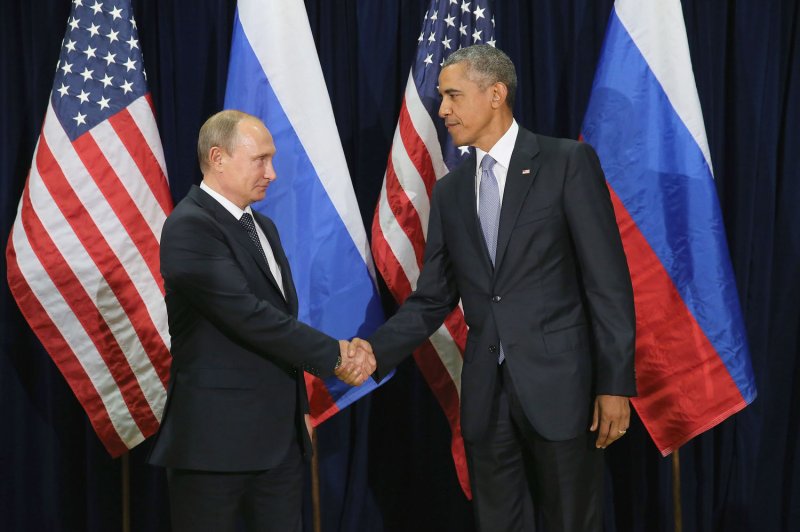Russian President Valdimir Putin (L) and U.S. President Barack Obama shake hands for the cameras before the start of a bilateral meeting at the United Nations headquarters September 28, 2015 in New York City. Putin and Obama were in New York City to attend the 70th anniversary general assembly meetings. Pool Photo by Chip Somodevilla/UPI |
License Photo
To distort Martin Luther King: I too have a fantasy. Suppose it is President Barack Obama and not Russian President Vladimir Putin who is the cleverer strategist. Suppose Mr. Obama cunningly set a trap in Syria for President Putin that either will lead to a negotiated political settlement or embroil Moscow in a Syrian quagmire? Or is this a dream run amok in that there is no way that a community organizer turned university law professor could have outwitted and outmaneuvered a former KGB spymaster?
Last week was not a good one for either the United States or for President Obama. The annual UN General Assembly meeting of heads of government became the venue for President Putin making a mockery of Obama's Syrian Strategy. Putin then stunned the anti-Islamic State Coalition with the announcement that Russian aircraft were striking Syrian "terrorists" aiming to topple the Damascus government headed by Bashar al Assad. Adding insult to injury, Russia created an intelligence center in Baghdad linking America's erstwhile ally Iraq with Russia, Iran and Syria.
Howls of criticism over these debacles from left and right still reverberate throughout the White House. However, suppose these critics were wrong. Suspend belief for a moment. Obama's "strategy" to destroy IS was failing. His contradictory top priorities of demanding that Assad must go and the Islamic State in Syria must be destroyed were incompatible and unworkable. How could Obama resolve this predicament?
Because the administration was only prepared to use minimal American force with great reluctance and absent stronger U.S. leadership and commitment Arab allies would not do more, someone else had to do the heavy lifting. Enter Russia and who better than Putin? Already bogged down in Ukraine and seeking a way out -- and last Friday's meeting in Paris with French President Francois Hollande, German Chancellor Angel Merkel, Ukrainian President Petro Poroshenko and Mr. Putin may be the first step -- Syria offered the Kremlin an exit strategy.
Even by sending a modest military force, Putin was demonstrating that, unlike the U.S. who readily abandons its friends and allies such as Presidents Mubarak and Qaddafi and intervenes elsewhere precipitating eventual chaos -- Iraq and Afghanistan -- Russia stands by its partners. And Obama knew Russia's actions would raise Putin's image and popularity at home at least for the short term.
Indeed, reacting to a shrinking economy, in a major speech last December, Putin guaranteed his countrymen that in two years time, all would be well on the economic front. With the current state of oil prices, Putin is also running low on foreign reserves. So it is extremely unlikely he can deliver on that promise. Hence, while Putin's political future is safe for the moment, for the long-term things could go badly Thus, in this fantasy about Obama's mind, Syria offers Putin further opportunities.
Russian air strikes will sustain the Assad regime for the short term. But if Russia does not wish to be drawn into an Afghan-like quagmire that helped implode the Soviet Union and cause what Putin called the greatest geostrategic catastrophe of the last century, these missions in Syria will not continue indefinitely. If they do, then Syria could become a Russian nightmare. A stronger Assad might be more prone to accepting a diplomatic settlement given he would have more influence in negotiating a more favorable outcome. If the war drags on, Russia is trapped. While the Syrian people will suffer, that was inevitable without Russian intervention. Either way, Obama comes out ahead.
If Putin takes the high road, sanctions will be lifted and possibly the Russian economy will quickly change direction. If it does not, Putin's longevity is in question. While Obama may not be in office long enough to claim either result, that could be his legacy -- if one were prepared to accept the president's strategic acumen.
Time to wake up. Reality trumps fantasy. Readers will have concluded that this rendition is far too generous to Obama. If Obama were a true strategist, he would confront the facts and emulate what George W. Bush was forced to do in 2006 regarding the disintegrating conditions in Iraq. Bush made massive changes to his strategy. So too must Obama. It is unlikely he will.
The administration's strategy for destroying the Islamic State -- and some argue there is no strategy -- is not working and actually is failing badly. Russian and Iranian interventions into Syria may or may not pour gasoline on this fire. Yet more of the same on Obama's part will be disastrous.
___________________________________________________________
Harlan Ullman is UPI's Arnaud de Borchgrave Distinguished Columnist; Chairman of the Killowen Group that advises leaders of government and business; and Senior Advisor at both Washington D.C.'s Atlantic Council and Business Executives for National Security. His latest book is A Handful of Bullets: How the Murder of Archduke Franz Ferdinand Still Menaces the Peace.















